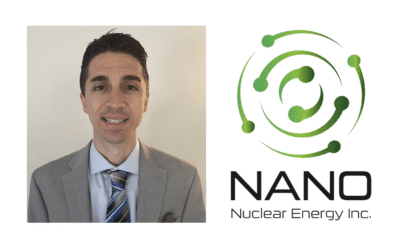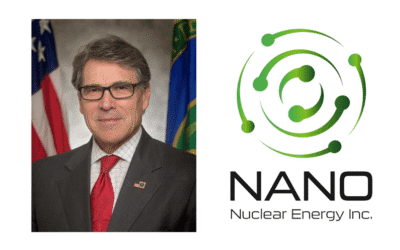NANO Nuclear Energy Inc. (“NANO Nuclear”), a company emerging from the shared micro Small Modular Reactor (µSMR) and Advanced Nuclear Reactor (ANR) ambitions of a world class nuclear technical team, filled with influential and foremost nuclear experts in the field, working alongside business and industry professionals, possessing strong relationships with both government, and the private and public nuclear industries, is pleased to announce that it has formed a subsidiary, HALEU Energy Fuel Inc., to develop, improve, and accelerate the domestic production of High-Assay Low Enriched Uranium (HALEU) and meet the growing demand for the fuel required to power advanced nuclear reactors and reinforce the United States of America’s energy sovereignty.
Figure 1 – NANO Nuclear Energy Inc. New Subsidiary, HALEU Energy Fuel Inc.
The subsidiary will focus on the future development of a domestic HALEU fuel fabrication pipeline for the broader advanced nuclear reactor industry, a national laboratory fuel supply, and providing fabricated fuels for research purposes. Furthermore, it will play a crucial role in powering NANO Nuclear’s own proprietary portable advanced nuclear reactor, “ZEUS”.
“Without a HALEU supply chain, many advanced reactor designs and advanced fuels will simply not be developed,” said Maria Korsnick, Nuclear Energy Institute’s President and Chief Executive Officer. Enriched between 5% and 20% with uranium-235, the main fissile isotope that produces energy during a chain reaction, HALEU fuels bring improved economics and inherent safety features, while also increasing the amount of carbon-free electricity that can be generated. Necessary for advanced nuclear reactors, the industry anticipates it may need nearly 600 metric tons of HALEU by 2030.
“We have invested a lot of time in discussions, planning, and strategizing with the industry’s foremost scientists, engineers, laboratory directors, and nuclear experts on the future of the nuclear and reactor space,” said James Walker, NANO Nuclear Energy’s CEO and Director. “What we have understood is the unique importance of HALEU fuel in the development and propagation of advanced nuclear reactors, not just for our Company, but for the benefit of the national development of nuclear technologies as well. As such, we saw the opportunity to create a domestic fuel producer and distributor, and at the same time become a truly vertically integrated nuclear energy company. This sector will be incredibly important in the next several years as the mSMR industry continues to expand, requiring additional resources, and attracting a broad new influx of innovators, companies, and technologies.”
“It is an exciting development to take our first steps into the production of HALEU fuel,” said Dr. Jeffrey L. Binder, Head of Nuclear Laboratories and Technologies. “My relationships and connection with the numerous national laboratories across the United States put us in good stead, ensuring we have access to some of the most advanced technologies and preeminent minds in our journey to create a company capable of supplying domestically produced HALEU fuel to the broader marketplace.”
The issue of energy independence has been thrust to the fore in recent years as governments look to strengthen domestic production of nuclear energy. According to Columbia’s Center for Global Energy Policy, Russia has been the only commercial source of HALEU and has accounted for nearly 40 percent of global uranium conversion services in 2020. Now, geopolitical events necessitate alternative sources of reactor fuel. As such, domestic entities working to create HALEU on American soil, with the support of the INL and U.S. government, are imperative to establishing the aforementioned energy independence. In fact, steps have already been taken to address this matter, as Congress directed the DOE to establish a HALEU availability program in the Energy Act of 2020 and the U.S. Nuclear Regulatory Commission (NRC) recently approved Centrus Energy’s request to make high-assay low-enriched uranium fuel (HALEU) at its enrichment facility in Piketon, Ohio. Furthermore, the recently signed Inflation Reduction Act (IRA) is yet another example of the U.S. government working to incentivize the industry, as amongst the approximately $369 billion in climate provisions, $700 million has been allocated for the development of a domestic supply chain for HALEU.
“HALEU is vital to the development of the next generation of advanced nuclear reactors,” said Dr. Ian Farnan, Lead of Nuclear Fuel Cycle Radiation and Materials. “Its importance to the entire industry cannot be understated, and as such, it is a pleasure to see NANO Nuclear take a proactive approach to securing the future of this industry by establishing a domestic fuel fabrication business. This will play an enormous role in enabling the growth of not just NANO Nuclear, but the entire industry.”
“When I was first inspired to form NANO Nuclear, I could not envision the momentum that we have witnessed in this past year,” said Jay Yu, Founder, Chairman and President of NANO Nuclear Energy Inc. “Now, we are on our way to becoming a truly vertically integrated company. I have always said that a relationship with regulatory bodies and the government are incredibly important for us, and they will continue to be so as we begin working towards the domestic production of HALEU fuel on American soil.”
Related Articles
NANO Nuclear Appoints Experienced Communications and Capital Markets Professional Matthew Barry as Director of Investor Relations
NANO Nuclear Energy Inc. (NASDAQ: NNE) (“NANO Nuclear” or “the Company”), a leading advanced nuclear energy and technology company focused on developing clean energy solutions, today announced that Matthew Barry has joined the Company as its Director of Investor...
NANO Nuclear Appoints Former U.S. Secretary of Energy and 47th Governor of Texas Rick Perry as Chairman of its Executive Advisory Board
NANO Nuclear Energy Inc. (NASDAQ: NNE) (“NANO Nuclear” or “the Company”), a leading advanced nuclear energy and technology company focused on developing clean energy solutions, today announced that it has appointed Rick Perry, former Governor of Texas and the United...





